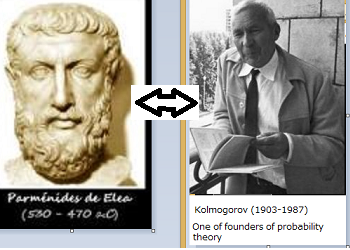4.1.1 Kolmogorov's extension theorem and the linguistic interpretation
And, through trial and error, Kolmogorov found his extension theorem, whose spirit says that
$(\sharp_1):$ Let $(X, {\mathcal F}, P)$ be a probability space. Then, the probability that a event $\Xi \;\; ( \in {\mathcal F})$ happens is given by $
P(\Xi)$
which surely corresponds to
$(\sharp_2):$ "Only one probability space is permitted"
Therefore, we want to say that
$(\sharp_3):$ "Only one measurement is permitted" in the linguistic interpretation ($\S$3.1)
$(\sharp_4):$ Parmenides (born around BC. 515) and Kolmogorov (1903-1987) said about the same thing

Let ${\widetilde \Lambda}$ be a set. For each $\lambda\in{\widetilde \Lambda}$, consider a set $X_\lambda$. For any subset $\Lambda_{1} \subseteq \Lambda_{2}({} \subseteq {\widetilde \Lambda}{})$, define the natural map $ \pi_{\Lambda_{1},\Lambda_{2}}: \times_{\lambda\in\Lambda_{2}}X_{\lambda} \longrightarrow \times_{\lambda\in\Lambda_{1}}X_{\lambda} $ by
\begin{align} \times_{\lambda\in\Lambda_{2}}X_{\lambda} \ni (x_\lambda )_{\lambda \in \Lambda_2 } \mapsto (x_\lambda )_{\lambda \in \Lambda_1} \in \times_{\lambda\in\Lambda_{1}}X_{\lambda} \tag{4.1} \end{align}Especially, put $\pi_{\Lambda}=\pi_{\Lambda,{\widehat \Lambda}}$. The following theorem guarantees the existence and uniqueness of the observable. It should be noted that this is due to the linguistic interpretation ($\S$3.1), i.e., "only one measurement is permitted".
| $\bullet$ | for any $\Lambda_1$, $\Lambda_2$ $\in$ ${\cal P}_0 ({\widehat \Lambda})$ such that $\Lambda_1 \subseteq \Lambda_2$, |
Then, there uniquely exists the observable ${\widetilde{\mathsf O}}_{\widehat{\Lambda}}$ $\equiv$ $\bigl(\mathop{\mbox{$\times$}}_{\lambda\in{\widehat \Lambda}}X_{\lambda}, $ $\mathop{\mbox{$\times$}}_{\lambda\in{\widehat \Lambda}} {\cal F}_{\lambda},$ ${\widetilde F}_{\widehat \Lambda} \bigr)$ in $\overline{\mathcal A}$ such that: \begin{align} {\widetilde F}_{\widehat \Lambda} \bigl({} \pi_{\Lambda}^{-1}({\Xi}_{\Lambda}{}) \bigr) = F_{\Lambda} \bigl({}{\Xi}_{\Lambda} \bigr) \quad ({}\forall {\Xi}_{\Lambda} \in \mathop{\mbox{$\times$}}_{\lambda\in\Lambda} {\cal F}_{\lambda},~ \forall\Lambda\in{\cal P}_0 ({\widehat \Lambda}){}). \tag{4.3} \end{align}
Let ${\widetilde \Lambda}$ be a set. For each $\lambda\in{\widetilde \Lambda}$, assume that $X_\lambda$ is a separable complete metric space, ${\cal F}_{\lambda}{}$ is its Borel field. For each $\lambda \in {\widetilde \Lambda} $, consider an observable ${\mathsf O}_\lambda$ ${{=}}$ $(X_\lambda , {\cal F}_\lambda , F_\lambda{})$ in $\overline{\mathcal A}$ such that it satisfies the commutativity condition, that is,
\begin{align} F_{k_1} ({}\Xi_{k_1} {}) F_{k_2} ({}\Xi_{k_2} {}) = F_{k_2} ({}\Xi_{k_2} {}) F_{k_1} ({}\Xi_{k_1} {}) \quad ({}\forall \Xi_{k_1} \in {\cal F}_{k_1} , \; \forall \Xi_{k_2} \in {\cal F}_{k_2} , \; k_1 \not= k_2) \tag{4.4} \end{align}Then, a simultaneous observable $\widehat{\mathsf O}$ ${{=}}$ $({}\times_{\lambda \in {\widetilde \Lambda}} X_\lambda , \boxtimes_{\lambda \in {\widetilde \Lambda}} {\cal F}_\lambda , $ $ {\widehat F} {{=}} \times_{\lambda \in {\widetilde \Lambda}} F_\lambda {})$ uniquely exists. That is, for any finite set $\Lambda_0 (\subseteq {\widetilde \Lambda} )$, it holds that
\begin{align} {\widehat F } \big({} (\times_{\lambda \in \Lambda_0} \Xi_\lambda) \times (\times_{\lambda \in {\widetilde \Lambda}\setminus \Lambda_0} X_\lambda) \big) = \times_{\lambda \in \Lambda_0} F_\lambda ({}\Xi_\lambda{}) \qquad (\forall \Xi_\lambda \in {\cal F}_\lambda, \forall \lambda \in \Lambda_0 ) \end{align} Proof.The proof is a direct consequence of Theorem 4.1. Thus, it is omitted.Remark 4.3 [Why is the Kolmogorov's extension theory fundamental in probability theory ?] Now we can answer the following question:
| $(B):$ | Why is the Kolmogorov's extension theory fundamental in probability theory ? |
| $(C):$ | The linguistic interpretation and Kolmogorov extension theorem have to be compatible |
